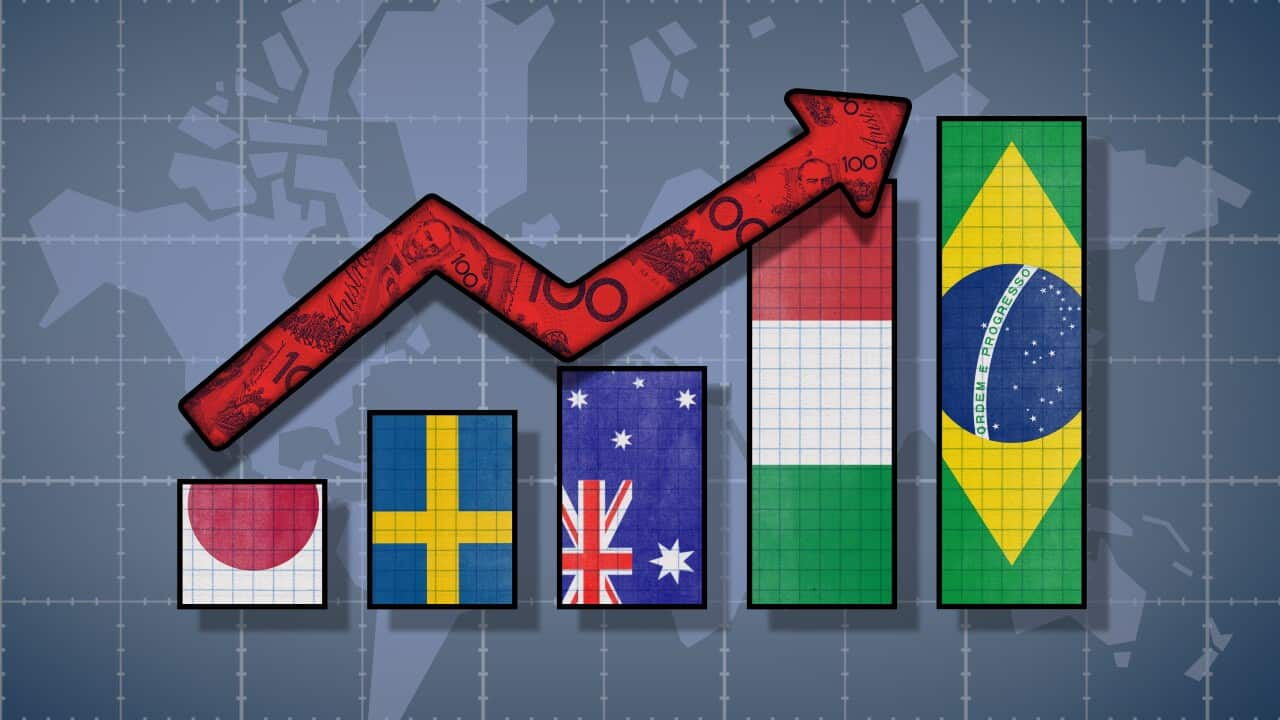Key Points
- The nation's central bank is expected to lift the official cash rate again on Tuesday.
- There are more increases forecast for the months ahead.
Australia's central bank is set to hike the official interest rate again on Tuesday amid fears for cash-strapped mortgage holders, with more seeking help amid signs further increases are on the cards.
It would be the fourth consecutive increase by the Reserve Bank of Australia (RBA). The consensus of financial market economists is a 50 basis point rise in the official cash rate, which would take it to 1.85 per cent.
The figure is up from a record low of 0.1 per cent in April, with RBA's moves aimed at bringing inflation — — under control.
The RBA's board wants to curb inflation to its preferred target band of 2 to 3 per cent, but this is likely to be some time off yet, with Treasurer Jim Chalmers recently warning that it would likely peak in the December quarter at 7.75 per cent.

The rate was at 0.1% as recently as April.
What an interest rise means for those with a mortgage
The expected rise would yet again pave the way for banks to increase the cost of their variable-rate mortgage products. As they've climbed over recent months, the RBA has sought to ease concerns over mortgage stress. Indeed, its new deputy governor Michelle Bullock said in a July speech that half of owner-occupiers with a variable rate home loan were two years ahead on their repayments.
But people such as Mortgage Stress Victoria legal director Matthew Martin, paint a dire picture of the situation those who aren't ahead on their repayments are facing.
Mr Martin and his colleagues help those who are not part of the RBA's statistic. Many are vulnerable and suffering from mental ill health, and some are women victim-survivors of domestic violence.
He said there has been increased demand for services since the central bank started hiking the cash rate, and case severity has also worsened.
"Previously we only saw about 10 per cent of our casework in the later stages of mortgage stress — so where clients have been sued in court or repossession is imminent," Mr Martin said.
"Now we're seeing a quarter of our clients at those later stages where court proceedings have been commenced."
'Recipe for disaster'
Anglicare Australia reports a similar scenario.
Deputy director May Azize said the charity had seen a "spike" for its financial counselling and debt assistance services. This includes those who she said wouldn't normally seek assistance, such as mortgage holders.
Many people needing help with mortgage debt were those who had bought property in the past couple of years against the backdrop of low interest rates and high property prices.
"So their interest rates have been really low and their mortgages have been really big, and that's a recipe for disaster when interest rates go up," Ms Azize said.
Ms Azize says the charity's resources are already stretched, and she is concerned further rate increases will mean more people requiring assistance it may not be able to provide.
"The more people who come to us for help, the fewer people we can help," she said.
"Sometimes we might need to turn them away, sometimes we need to refer them to someone else who can help and hope that they are able to."
When will the interest rate rises stop?
The ASX 30 Day Cash Interbank Cash Rate Futures gives investors an indication of what to expect from the RBA. The forecasts that the official cash rate will peak in March next year at around 3.24 per cent before gradually falling over the following months to December.
But AMP Capital chief economist Shane Oliver has a more conservative prediction. He expects the RBA will lift the cash rate by 50 basis points on Tuesday, with another rise of between 25 and 50 basis points in September before slowing its pace.
"[The cash rate] may reach 2.35 per cent by the year's end, and I think the peak will be 2.6 per cent which we'll reach in January or February," Mr Oliver said, adding that the RBA may then hold and assess what impact it has on inflation.
Mr Oliver said this is because the RBA appears to be getting "a bit of traction" in its bid to curb inflation. He said there are early signs retail spending is slowing (the Australian Bureau of Statistics recently noted a 0.2 per cent increase in June — the smallest rise so far this year), and a slowdown in the housing market (Commonwealth Bank economist predict national home prices could fall 6 per cent by the end of the year).
He said the central bank would want to avoid a scenario where aggressive rate hikes sparked a recession.
"They don't want to end up going too far, causing a collapse in inflation and then have to slash rates back the other way," he said. "They'll lose credibility if they do that."
What should I do if I need help?
Financial Counselling Australia CEO Fiona Guthrie said an important first step was to discuss your situation with your lender.
"Explain your circumstances, and be really careful about not agreeing to pay more than you can afford... if you're having trouble working this out, then speak to a financial counsellor," she said.
"The last thing banks want to do is repossess a home. They want to keep you there," she said.
Ms Azize said those in financial distress often seek help from a financial counsellor in the later stages, but it was important to reach out for help early on because it makes it easier to help.
Mr Martin agreed, but said those seeking help in the latter stages still had options.
"There's always something that can be done, whether it's negotiating a hold on repayments for a certain amount of time, whether it's putting them on a payment arrangement so they can afford their mortgage in order to keep a roof over their head; negotiating interest rate reductions or an extension of the life of the loan to make the loan more affordable," he said.
- With AAP.











